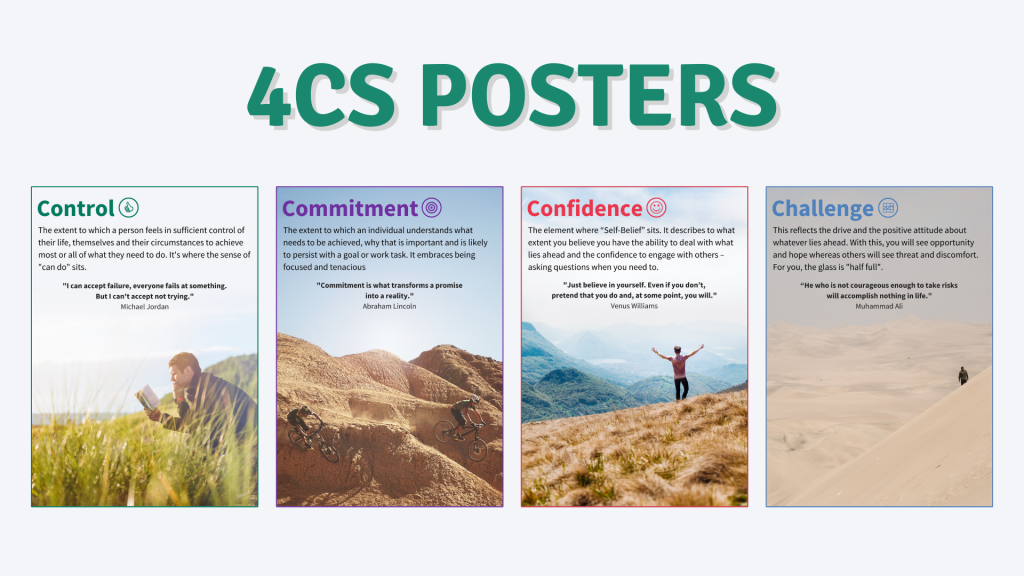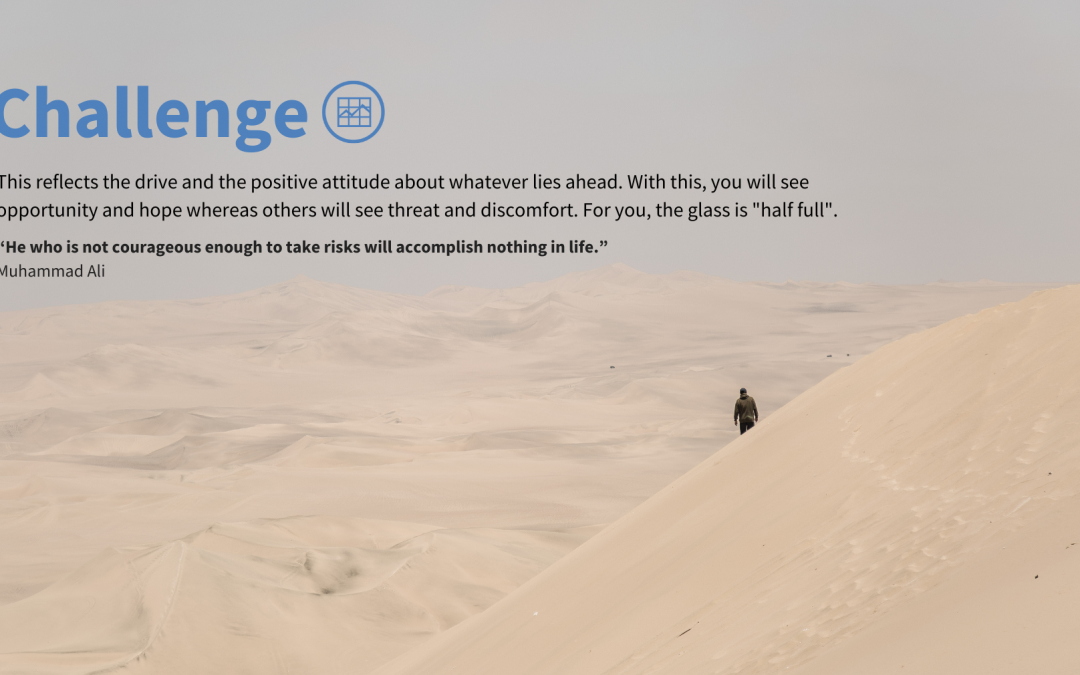WHAT DO WE MEAN BY CHALLENGE
WHY IS IT IMPORTANT FOR OUR MENTAL RESPONSES
Challenge is the third of the 4 constructs of the 4Cs mental toughness concept.
By Challenge we mean being able to deal with the current situation and the future – even though this might not be entirely clear.
It describes the extent to which we see what is around us and what lies ahead as being full of threats or full of opportunity.
Two people could look at the same circumstances. One would see the threats outweighing the benefits and will not seize the opportunities. The other will see the opportunity, understand and accept the risk and be minded to grasp opportunity.
Originally identified by Suzanne Kobasa who found that many senior leaders were not only resilient but would embrace opportunities in the knowledge that they might not work out as planned. This construct consists of two independent but related factors:
Risk Orientation
This describes the extent to which the individual is mentally prepared to be open to new experiences, new situations, new people, etc where there is an element of the unknown and where there is scope for something not going according to plan.
The more mentally tough in terms of risk orientation will see the opportunity and the risk but will be inclined to find the opportunity more appealing. They are likely to be intrigued and perhaps excited by the prospect of new and different experiences, they will relish change.
The more mentally sensitive, on the other hand, will view the situation as more threatening rather than appealing and are more likely to find the prospect of change uncomfortable and will prefer that things remain the way they were. They will see the threat before they see the opportunity.
The more mentally tough, the more risk orientated are, to some extent driven to find new and different ways of doing things. They can be solution focused. In extremis they they can however be absorbed by the thrill of the new.
However, the nature of risk is that things can go awry and may do so more often than if one plays it safe. How one responds mentally to this is also part of the Challenge construct.
Learning Orientation
Working with senior leadership teams, practitioner partners and ourselves began to notice some interesting behaviour patterns.
Firstly the response to failure or setback wasn’t always the same. Some would do their best to forget or ignore what happened “That didn’t work. Bin it. Forget about that . We’re not doing that again”.
On the other hand, some would respond differently – “that didn’t work. It was uncomfortable but I would like to get it right if it happened again. Let’s work out what happened and see if we can learn from that”
The more mentally tough in this regard would be more reflective about what they experience and about what they see around them — reflecting on success but especially on failure where there was learning, Focusing very much on solutions.
The more mentally sensitive in this regard would tend to avoid reflection, preferring to move on and put the past behind them. This often meant they would repeat mistakes or make slow progress.
For both risk orientation and learning there is a need for courage. The challenge factor brings positivity into the mental toughness concept.
Understanding these factors helps to explain why two people, who can otherwise be identical in abilities, skills, etc., can respond differently to the same challenges and opportunities. The difference lies in their mental attitude towards these.
Where Control and Commitment can broadly be seen as elements of Resilience, the Challenge construct introduces aspects of positivity. With Challenge we see the world around us as uncertain, ambiguous and volatile but also laden with opportunity as well as threat and with an appropriate mental approach we can grasp that opportunity and learn how we can do even better.
As with all the mental toughness factors, they are not about describing people in terms of good or bad. They are there to explain responses and enable the individual to be self-aware about why they act the way they do when something happens.
Although it is true that in many settings being more mentally tough on these factors conveys an advantage, it is equally true that the more mentally tough can be disadvantaged at times. This is why self-awareness about your mental toughness and each factor, normally invisible to you and others, is so important. It brings a new dimension to development that promises to make it more effective.
- Those who are more mentally tough when it comes to the Challenge construct, can, without self-awareness;
- Take on too much – get excited about all opportunities and create an initiative overload.
- Take on too much risk sometimes discounting the level of risk.
- Be easily bored when doing repetitive things.
- Be easily distracted when something interesting appears.
- Be adrenaline junkies – seeking “the thrill of the new”.
- Enjoy learning so much that they don’t get around to applying it.
- Positive and optimistic even when it’s important to be realistic.
- Appear arrogant with their knowledge and their attitude.
- Be dismissive of those who are “not like them”.
Those who are more mentally sensitive can bring useful qualities to the team if these are acknowledged. They can;
- Be more realistic about risk.
- Know when enough reflection has taken place and overthinking is emerging.
- Be more focused on the outcome.
- Understand why sometimes “If it isn’t broken, don’t try to fix it”, etc.
- The concept brings a crucial dimension to development. All the factors in mental toughness can be developed. However, research consistently shows that training and development (and coaching) if not customised can be very ineffective and even harmful.
Although training can be individualised, it is rarely customised. There is still a tendency for “one size fits all approaches”. Solutions are generally drawn from a tool kit because they have been shown to work. Many do but they don’t all work for all people.
Development is a challenge and an opportunity like any other activity. The individual’s mental response will be significant in their capability to develop. Understanding someone’s mental toughness profile addresses the challenge of customisation.
The Challenge construct is strongly associated with curiosity, creativity and innovation. In turn, this can be valuable in development where many approaches have been around for decades. Practitioners who are more mentally tough in terms of the Challenge construct can either develop new approaches or freshen existing approaches, often improving what is there and its application.
Self-awareness about your mental responses – those invisible responses – really matters.
This and many other aspects are discussed much more fully in “Developing Mental Toughness” by Strycharczyk, Clough and Perry. Kogan Page 3rd Edition.
Like the image used in this post on Challenge and the 4Cs? A set of downloadable posters are available here.



